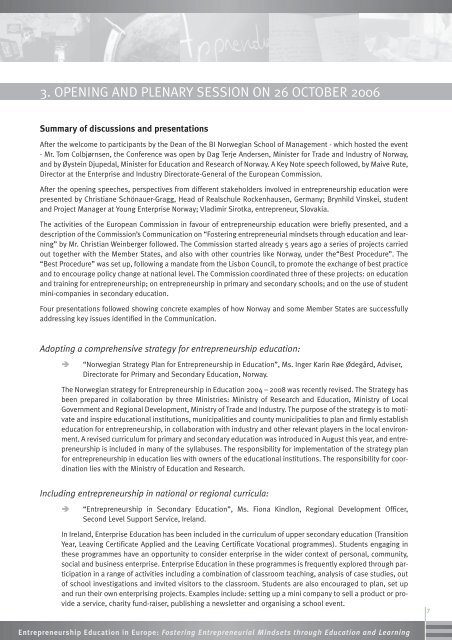Final report - European Commission - Europa
Final report - European Commission - Europa
Final report - European Commission - Europa
Create successful ePaper yourself
Turn your PDF publications into a flip-book with our unique Google optimized e-Paper software.
3. OPENING AND PLENARY SESSION ON 26 OCTOBER 2006Summary of discussions and presentationsAfter the welcome to participants by the Dean of the BI Norwegian School of Management - which hosted the event- Mr. Tom Colbjørnsen, the Conference was open by Dag Terje Andersen, Minister for Trade and Industry of Norway,and by Øystein Djupedal, Minister for Education and Research of Norway. A Key Note speech followed, by Maive Rute,Director at the Enterprise and Industry Directorate-General of the <strong>European</strong> <strong>Commission</strong>.After the opening speeches, perspectives from different stakeholders involved in entrepreneurship education werepresented by Christiane Schönauer-Gragg, Head of Realschule Rockenhausen, Germany; Brynhild Vinskei, studentand Project Manager at Young Enterprise Norway; Vladimir Sirotka, entrepreneur, Slovakia.The activities of the <strong>European</strong> <strong>Commission</strong> in favour of entrepreneurship education were briefly presented, and adescription of the <strong>Commission</strong>’s Communication on “Fostering entrepreneurial mindsets through education and learning”by Mr. Christian Weinberger followed. The <strong>Commission</strong> started already 5 years ago a series of projects carriedout together with the Member States, and also with other countries like Norway, under the“Best Procedure”. The“Best Procedure” was set up, following a mandate from the Lisbon Council, to promote the exchange of best practiceand to encourage policy change at national level. The <strong>Commission</strong> coordinated three of these projects: on educationand training for entrepreneurship; on entrepreneurship in primary and secondary schools; and on the use of studentmini-companies in secondary education.Four presentations followed showing concrete examples of how Norway and some Member States are successfullyaddressing key issues identified in the Communication.Adopting a comprehensive strategy for entrepreneurship education:“Norwegian Strategy Plan for Entrepreneurship in Education”, Ms. Inger Karin Røe Ødegård, Adviser,Directorate for Primary and Secondary Education, Norway.The Norwegian strategy for Entrepreneurship in Education 2004 – 2008 was recently revised. The Strategy hasbeen prepared in collaboration by three Ministries: Ministry of Research and Education, Ministry of LocalGovernment and Regional Development, Ministry of Trade and Industry. The purpose of the strategy is to motivateand inspire educational institutions, municipalities and county municipalities to plan and firmly establisheducation for entrepreneurship, in collaboration with industry and other relevant players in the local environment.A revised curriculum for primary and secondary education was introduced in August this year, and entrepreneurshipis included in many of the syllabuses. The responsibility for implementation of the strategy planfor entrepreneurship in education lies with owners of the educational institutions. The responsibility for coordinationlies with the Ministry of Education and Research.Including entrepreneurship in national or regional curricula:“Entrepreneurship in Secondary Education”, Ms. Fiona Kindlon, Regional Development Officer,Second Level Support Service, Ireland.In Ireland, Enterprise Education has been included in the curriculum of upper secondary education (TransitionYear, Leaving Certificate Applied and the Leaving Certificate Vocational programmes). Students engaging inthese programmes have an opportunity to consider enterprise in the wider context of personal, community,social and business enterprise. Enterprise Education in these programmes is frequently explored through participationin a range of activities including a combination of classroom teaching, analysis of case studies, outof school investigations and invited visitors to the classroom. Students are also encouraged to plan, set upand run their own enterprising projects. Examples include: setting up a mini company to sell a product or providea service, charity fund-raiser, publishing a newsletter and organising a school event.7Entrepreneurship Education in Europe: Fostering Entrepreneurial Mindsets through Education and Learning



